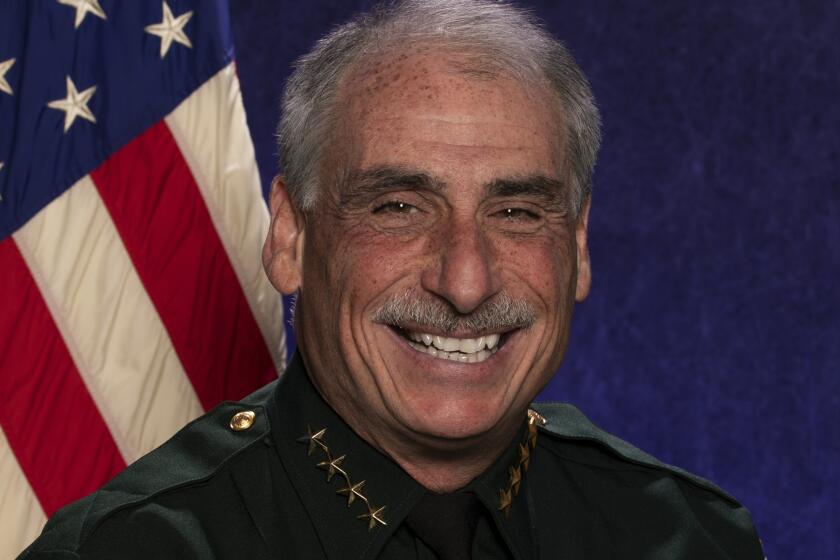Military Declares War on Payday Lenders
On Gen. Screven Way, the one-mile strip of fast-food joints and pawn shops leading to the front gate of Ft. Stewart, getting a cash loan of $100 to $500 is about as easy as buying a cheeseburger.
Numerous strip-mall businesses bear such names as Check Into CA$H (“Need Cash Today? It’s Easy as 1-2-3”), First American Cash Advance, Gold Check C.S. Payday Advance, and PJ Cash (“Civilian and Military Welcome”).
Ft. Stewart has declared so-called payday lenders enemies at its gate, accusing them of preying on U.S. troops with high-interest, short-term loans that plunge them deep into debt.
“It’s like riding a merry-go-round -- once you get on, it’s hard to get off,” said Frederick Sledge, an emergency relief officer at Ft. Stewart whose office gives interest-free loans to soldiers in financial trouble.
Military bases throughout the nation have become magnets for payday lenders, which charge fees as high as $30 every two weeks per $100 borrowed -- which equals an annual interest rate of 780%.
Earlier this month, officials from Ft. Stewart and Kings Bay Naval Submarine Base urged Georgia lawmakers to crack down on such loans, which are illegal under state law but thrive because of lax enforcement.
Lt. Col. Russ Putnam, a Ft. Stewart lawyer, told legislators that stress over paying off these loans hurts troop morale and the combat readiness of the post’s 3rd Infantry Division, which led the assault on Baghdad. In extreme cases, soldiers saddled with debt must be discharged.
“When we lose those people because of payday check cashing, they’re as good as dead to us. They are gone,” Putnam told lawmakers.
The Community Financial Services Assn., which represents about 15,000 payday loan stores nationwide, denies that its members are taking advantage of soldiers. In March, the association urged its lenders to suspend the collection of loan payments from troops sent to the war in Iraq.
The association says that, in any case, only about 2% of customers are active-duty military.
Jet Toney, a lobbyist for payday lenders in Georgia, said perhaps the military should to focus on educating troops about money instead of bashing payday lenders as predators.
“They’re not preying on anybody; they’re just open for business,” Toney said. “It strikes me hard that the military protests so much when they have some responsibility on their end as well. How many 18- to 22-year-olds make perfect financial decisions?”
Navy Petty Officer 2nd Class Jason Withrow, who works on a nuclear submarine at Kings Bay, took out a payday loan to make ends meet after being hurt in a car wreck. A back injury had forced him to drop his second job loading beer kegs at the Navy exchange. Withrow soon found himself taking out loans with other payday lenders to pay the interest on his initial advance.
“In five months, I spent about $7,000 in interest and didn’t even pay on the principal $1,900,” said Withrow, 24, of Brooklyn, Mich. “I was having marital problems because of money and didn’t know what to do for Christmas for my kid.”
He finally asked his commanders for help. The base emergency relief office agreed to pay Withrow’s loans. Now he has a schedule to repay the money over 18 months, with commanders watching his finances.
“I will never go back to these idiots,” Withrow said of lenders.
Other bases say they have had similar problems with troops sinking into payday debt.
The lenders “are targeting the post primarily because of the assurance they’ll be paid,” said Richard Bridges, spokesman for Ft. Carson, the Army post in Colorado Springs, Colo.
Lenders know that they will recoup their money because they can get the Army to help them collect. Soldiers who do not pay up can face a court-martial and loss of security clearance, and, in some cases, are kicked out of the Army.
At Ft. Carson a few years ago, officials began requiring lenders advertising in the post newspaper to list their annual interest rates; some were up to 560%.
At Ft. Bliss, Texas, officials at the Army Emergency Relief office estimate that nearly a tenth of the 10,000 active-duty troops there have needed financial counseling because of payday loans and other debt problems, such as high-interest rent-to-own plans and bounced checks.
Georgia law caps annual interest rates at 60%, but violations are a misdemeanor and rarely prosecuted.
Yvette Walters, the wife of a Ft. Stewart soldier, took a different approach, filing a class-action suit against Heritage Bank after taking out cash advances at annual interest rates of 340% to 592%. The bank settled last year by agreeing to pay $1.9 million to more than 11,500 people, many of them in the military.
Associated Press writers Erin Gartner in Denver and Chris Roberts in El Paso, Texas, contributed to this story.
More to Read
Sign up for Essential California
The most important California stories and recommendations in your inbox every morning.
You may occasionally receive promotional content from the Los Angeles Times.










